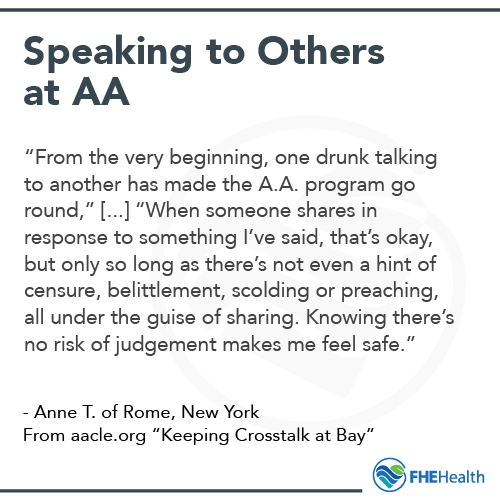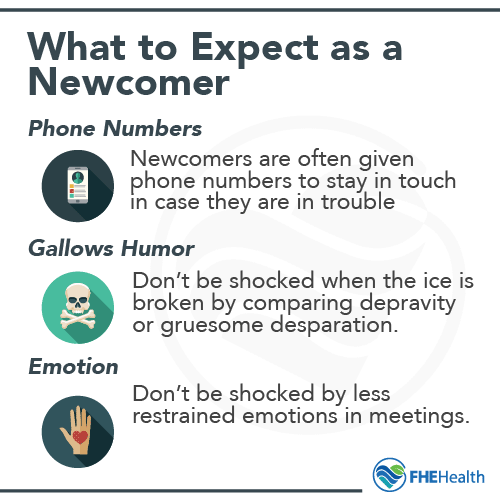
Updated May 31, 2023
If you’ve never gone to group therapy or A.A. meetings, you may not be sure about the rules or what you can say or do in the meeting. Depending on your amount of time, you may feel obligated to share something of ‘value’ or make a good impression. What you should focus on instead is getting the most out of the meetings. So, what do you say when you’re in group therapy? Fortunately, those who have been to group therapy and A.A. meetings in the past, as well as those running the meetings, have some basic rules that make attending your first meeting much easier.
At FHE, we want you to be comfortable when you’re sharing information about yourself with others and listening to what they have to say. That’s why we’ve put together this helpful etiquette guide for group therapy and A.A. meetings.
Speaking in A.A.: The Basic Rules
 The most important thing to remember is that the group wants you to share your experiences honestly. Generally, you’ll want to speak in first person and focus on the revelations or struggles you’ve had as well as how you’ve grown.
The most important thing to remember is that the group wants you to share your experiences honestly. Generally, you’ll want to speak in first person and focus on the revelations or struggles you’ve had as well as how you’ve grown.
A.A.’s colloquial term for alcoholics’ tales of their drinking years is the “Drunkalogues.” Certainly, you can share some aspects of your years of drinking, but you want to make sure you talk more about your transformation, aspirations and goals. Slipping into a tone of ‘reliving the glory days’ is generally frowned upon, you’re in a rehab or meeting, the path that got you there is more important than that temporary euphoria.
Using “I” statements is also important. People don’t want to be told what to do. It can sound preachy if you try to tell others what “we” or “you” should do as recovering alcoholics. Keep to “I” speech to keep the focus on how the fellowship has benefited you. It’s very likely that your story contains elements that are a shared experience, but do not assume that.
There are two kinds of A.A. meetings, open and closed on top of several different meeting formats. Open meetings allow anyone to attend and speak about their experiences in turn. Closed meetings are reserved for A.A. members only and those with a desire to stop drinking. There may be question portions to these meetings to support newcomers.
Speaking in Group Therapy: Basic Rules
 For group therapy, there are some basic rules generally enforced by a therapist leading the group. While AA meetings typically have a chair or someone that moves the meeting along through it’s format, Group Therapy will always be mediated by a therapist.. First, anything that anyone says or does is confidential. Second, you are given privacy. That means you don’t have to answer any questions or participate in any activities that you’re unhappy with. You also should not pressure others to participate. Violence, intimidation and hazing are not allowed.
For group therapy, there are some basic rules generally enforced by a therapist leading the group. While AA meetings typically have a chair or someone that moves the meeting along through it’s format, Group Therapy will always be mediated by a therapist.. First, anything that anyone says or does is confidential. Second, you are given privacy. That means you don’t have to answer any questions or participate in any activities that you’re unhappy with. You also should not pressure others to participate. Violence, intimidation and hazing are not allowed.
Another important note is that dating within the group is usually frowned upon. However, if you are dating someone in the group or if you know about people who are dating in the group, their personal lives and stories are off limits. Why? It could be embarrassing for them to talk about their intimate moments within the group and could make it hard for them to continue to attend.
Gossip is also frowned upon because secret grudges and gossip have the potential to be destructive. The rules dictate that you should speak freely to the individual you have a problem with to address your concerns directly.
What Should You Talk About in Group Therapy? Here’s What to Say in Group Therapy
It’s fairly common to have little or nothing to say. In that case, you should listen to what others are saying in the group therapy session. Understand that listening to others open up about their lives is important. When they discuss what they’ve gone through, it’s cathartic for them and for others.
Remember, it’s usually not appropriate to comment on what they’re going through, unless instructed by the therapist, but you can listen to understand how to tell your own story. Are you able to share a similar story or tell your story in a similar manner? This is intended to be a judgment-free arena, so don’t be scared to speak out. Keep in mind that this is not an opportunity to ‘one-up’ someone else’s story. There’s no glory in having a worse rock-bottom than someone else.
Do You Have to Participate in Group Therapy or A.A. Meetings?
No, and that’s something you should be strongly aware of. Not talking in an A.A. meeting is appropriate if you are concerned about speaking out. Sometimes, you may not be ready to talk about your past or your experiences. That’s fine. You should instead listen to what others have to say and be supportive of them and their goals. If there comes a time when you feel that you can open up, they will do the same for you. If you choose not to speak, remember that listening is most important. You should also avoid cross-talk because it can be offensive and embarrassing. It is also often against the rules.
What Is “Cross Talk” in A.A.?
Cross talking in A.A. is when a person gives advice to others who have already shared their stories. The individual speaks to them directly, instead of speaking to the group as a whole. Cross talk can also include interrupting the person who is speaking or asking them a question unexpectedly. Cross talking is generally frowned upon. If a person does not ask for the opinions of others, they should not be offered.
Here’s an example of cross talk in A.A.
Mary: “I went out with my friends last night, and they offered me alcohol. I turned them down, but it seemed like it soured our night.”
Cross talk: “Mary, you should have told them that it wasn’t polite to offer you alcohol; it’s threatening your sobriety!”
This is a conversation that can be had outside of group directly with Mary, but is inappropriate to say in front of the group. This opinion is not you ‘sharing your story’ or your ‘struggles’, it’s just how you would have ‘handled it’. If her story reminds you of a pertinent thing to share that you have experienced, that is fine. But keep in mind you should not come across as trying to ‘beat’ their story.
With the cross talk, the individual speaks directly to Mary, which is generally discouraged. With the appropriate response, they speak with the group, which is allowable and helps include everyone.
What Not to Say During AA Meetings
AA meetings provide a safe forum where members can share their experiences, give and receive support, and find tips for managing triggers in a healthy, constructive way. Knowing what topics to steer clear of is just as important as knowing what to say during a meeting.
AA Meeting Etiquette
Many new AA members are hesitant to speak up out of concern for breaking an unwritten rule and embarrassing themselves or making someone else feel uncomfortable. However, this setting is designed to let people talk candidly about their experiences, and active participation is key for getting the most from each session.
Allow Anonymity
One of the principal rules to follow in all interactions during AA meetings is to remain—and let others remain—anonymous. This is why members only provide their first names. Depending on the size of your community, it’s possible that you may see someone you know in an AA meeting, whether it’s a coworker, an old friend or acquaintance, or a public figure. It’s important to not draw attention to this connection during the meeting, especially until you have an opportunity to talk to them about how you and the individual feel comfortable relating to each other in that setting.
Confidentiality
Members also have a reasonable expectation of privacy and confidentiality during AA meetings. During the sessions, many people recount experiences related to addiction that were particularly painful, eye-opening, or even embarrassing. Any sensitive topics that members talk about during a meeting are expected to stay within the confines of the meeting room.
Don’t Monopolize or Hijack the Conversation
When it’s your turn to talk, do your best to keep your comments brief. Collect your thoughts and structure what you want to say before you speak, and make sure that what you’re saying is relevant to the discussion. Do your best to speak for no more than five minutes.
It’s also a good idea to be mindful of the nature of an experience you want to share, particularly if it caused harm to someone else. These stories might be therapeutic to share, but they can be distressing for listeners. A better option is to share sensitive or potentially troubling information that could upset or embarrass other members of the group in a one-on-one setting with a sponsor or leader.
Be Mindful When Talking about Triggers
For many people in recovery, grievances against another person are common and may have even contributed to their addiction. Whether it’s a parent, a spouse or a close friend who you harbor resentment toward, talking about the relationship and exploring any grievances may be part of the journey to sobriety. However, this can quickly devolve into simply venting frustration.
If you are able to keep the topic focused on how you manage triggers, then talking about grievances may be constructive. Otherwise, this may be a topic that’s better shared with a sponsor, a mental health care professional, or a trusted friend.
Avoid Cross Talk in AA Meetings
Cross talk in AA, or talking directly to an individual instead of addressing the group as a whole, is generally discouraged in meetings. Unless the person specifically asks for advice or feedback, no one should address them directly in a group setting.
Avoid Talking About Politics or Religion
A person’s political stances and religious beliefs are profoundly personal to them. An AA meeting isn’t the right place to compare and debate ideas and philosophies. The focus should solely be on managing addiction and getting and giving support to others who are on similar journeys.
Reach Out to FHE for Support With Substance Abuse and Mental Health Treatment
In a 16-year study of drinkers, it was discovered that 67 percent were abstinent at the 16-year follow-up point when they’d attended at least 27 weeks of A.A. meetings in the first year of sobriety. At FHE, we want you to know that we support you during every step of your recovery. If you want to know how to talk in A.A. or are asking yourself, “What do they talk about in A.A. meetings,” reach out to us at (833) 596-3502.






